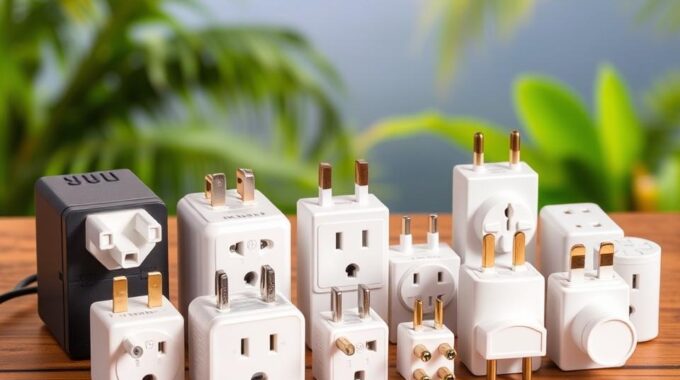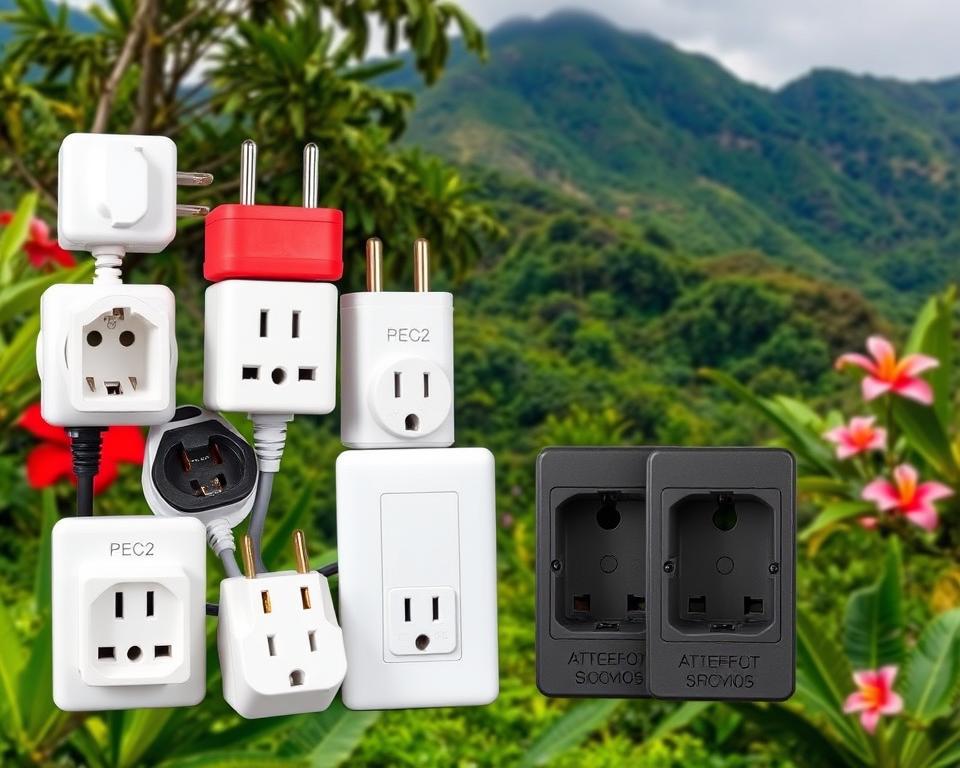As a hub for international workers and service providers, Costa Rica has introduced Law No…

A Guide to Electrical Plugs and Adapters for Costa Rica
Ever wondered why electrical plugs and voltage standards change so much between countries? Knowing the electrical plugs & adapters guide for Costa Rica is key for anyone heading to this stunning Central American spot. Costa Rica runs on 120V and 60Hz, using plugs A and B. These might be quite different from what you’re used to.
This guide will give you a detailed look at the Costa Rica power outlets. It’s designed to make sure you’re ready and won’t face any surprises on your trip. Whether you’re bringing your gadgets or just want to stay connected, understanding these electrical standards Costa Rica will make your journey smoother and more enjoyable.
Key Takeaways
- Costa Rica operates on 120V, 60Hz electrical standards.
- The common plug types are A (two-pronged) and B (three-pronged with grounding).
- Universal travel adapters are recommended for compatibility with over 150 countries.
- Devices need to match the 120V standard to avoid voltage converter issues.
- Stores like Walmart and Pequeño Mundo offer adapters for convenience.
- Awareness of local micro-climates can help in effective packing.
Introduction to Electrical Standards in Costa Rica
Knowing the Costa Rica electrical standards is key for anyone visiting or living there. Costa Rica uses 110-120 volts and has North American-style plugs (type A and B). This makes it easy for people from the U.S. and Canada, as their devices often work right away.
But, if you’re used to different electrical standards, you should be careful. You might need adapters to make sure your devices fit the local outlets.
The frequency in Costa Rica is 60 Hz, the same as in most of North America. If you bring appliances from places with different voltages, it’s very important to know the Costa Rica voltage requirements. Appliances made for 220-240 volts won’t work and could get damaged.
Costa Rica’s currency is the colón, but US dollars are also widely accepted. It’s a good idea to carry both cash and credit cards. This way, you’re ready for any situation, whether it’s an emergency or when you can’t use electronic payments.
Learning about Costa Rica’s electrical rules and updates is also helpful. You can find more info in this useful resource.
Understanding Costa Rica’s Voltage Requirements
The voltage requirements in Costa Rica are set at 110-120 volts. This matches the electrical systems in the United States and Canada. Travelers from these areas can use their gadgets without a voltage converter for Costa Rica. Most laptops, cell phones, and cameras work well within this range.
But, if you’re from Europe or Japan, you’ll need a different approach. Devices from these places often need a voltage transformer if they’re not dual voltage. You’ll also need a plug adapter for costa rica electrical sockets. Make sure your appliances can handle the local voltage to avoid damage.
In Costa Rica, you’ll find North American Non-Grounded (two-prong) and Grounded (three-prong) outlets. Many outlets have three holes, but some have only two. Using the right sockets for grounded plugs adds safety. Knowing the local socket types and voltage requirements can save you from surprises during your trip.
It’s smart to buy any needed adapters or voltage converters before you go to Costa Rica. You can find these in electronics stores or some hotels might provide them. For more info on electrical plugs and adapters in Costa Rica, check this link.
Types of Electrical Plugs Used in Costa Rica
Costa Rica mainly uses two types of plugs: Type B and Type A. Type B plugs have three prongs for a safe ground connection. It’s key to know these plug types if you plan to use devices there.
The outlets in Costa Rica work with 120 volts and 60Hz. This means you need to check if your appliances match these standards.
When traveling, it’s important to find the right adapters for Costa Rica. Universal travel power adapters are great, as they fit in over 150 countries, including Costa Rica. These adapters let you charge multiple devices at once with travel power strips.
For charging via USB, travel USB wall chargers are perfect. They make charging smartphones and other devices easy. You can find these chargers in high street stores at airports, but buying them before you travel can save you money.
Voltage converters are needed for appliances that use 220-240 volts. Knowing about these plug types helps visitors ensure their devices work with Costa Rica’s electrical systems.
Costa Rica Electrical Plugs & Adapters Guide for Costa Rica
Knowing what electrical plugs and adapters you need for Costa Rica is key. This country mainly uses Type A and B plugs, similar to those in the Bahamas. These plugs have two horizontal rectangular pins. The standard voltage is 120 V, with a frequency of 60 Hz, just like North America.
It’s important to know the difference between grounded and ungrounded plugs. This ensures your devices are safe and work properly.
Overview of Plug Types in Costa Rica
Costa Rica has both grounded and ungrounded plugs. Grounded plugs, with three prongs, offer extra safety. They ensure a solid connection.
Ungrounded plugs, with only two prongs, are good for devices that don’t need grounding. Visitors should check their devices to see if they can use ungrounded outlets safely.
Difference Between Grounded and Ungrounded Plugs
Grounded plugs fit into three-prong outlets and protect against electrical shocks. They are best for sensitive electronics. Ungrounded plugs, with only two prongs, might cause problems if used wrong.
For travelers, getting a universal travel adapter that fits both types is smart. It makes your electronic devices more versatile and useful during your stay.
International Travel Adapters for Costa Rica
Traveling to Costa Rica is exciting, but knowing about electrical equipment is key. If you’re from a place with different plugs, you’ll need international travel adapters for Costa Rica. They let you charge your devices safely in local outlets.
Costa Rica uses 120 volts, the same as the U.S. and Canada. Most devices from these places work fine without extra converters. But, if you’re from Europe, Australia, or other places, you might need a travel adapter for Costa Rica because of different plug types.
Getting a universal plug adapter for Costa Rica is a good idea. These adapters fit many plug types and have USB ports for easy charging. Also, some devices like hair dryers and curling irons need a voltage converter to avoid damage.
To learn more about electrical plugs and adapters in Costa Rica, check out this detailed guide. It explains the plug types used, like Type A and Type B, which are common in North America. With the right adapters, you can stay connected without any hassle.
How to Identify Compatible Devices for Costa Rica
Before you head to Costa Rica, make sure your devices are ready for the local power. Knowing which compatible devices with Costa Rica outlets you have is key. This means checking your devices’ voltage needs and if they fit the local plugs.
Signs of Dual Voltage Appliances
Today, many gadgets can handle different voltages, making them dual voltage. Look for signs that your devices can work with 110-240 volts. Here’s what to search for:
- Labels that say “110-240V.”
- User manuals that talk about international voltage standards.
- Power plugs that fit both Type A and B sockets in Costa Rica.
Checking Voltage Requirements for Your Devices
Make sure your devices are okay for Costa Rica’s 120 volts and 60 Hz frequency. If they’re not dual voltage, you’ll need a converter. Check your device’s details to see if it’s compatible:
- Check the voltage rating on the charger or device.
- Visit the manufacturer’s website for more info.
- For big power users like hair dryers, use a voltage converter to stay safe.
With the right info, you can tell if your devices will work in Costa Rica. This ensures a great trip. For more on electrical standards, see this guide.
Advice for Traveling with Electronics in Costa Rica
Traveling with electronics in Costa Rica needs careful planning. The country uses 120V and has plug types A and B. Knowing these details helps avoid problems. Follow these tips to keep your devices safe and working well during your trip.
Essential Tips for Packing Electrical Devices
Here are some tips for packing your electronics safely:
- Make sure chargers and adapters are easy to find in your luggage. This helps when you need to charge your devices quickly.
- Use surge protectors in areas with unreliable power. They protect your devices from sudden voltage spikes.
- Bring extra battery packs for long trips. In places far from power sources, they can be very useful.
- Check if your devices work with Costa Rica’s voltage and plug types. Dual voltage devices (100-240V) are great because they don’t need a converter.
- Know where to find adapters in big cities like San José and airports. This way, you’re prepared if you need one.

For more info on voltage and plug types in Costa Rica, visit this resource. With some planning and smart packing, your trip to Costa Rica will be worry-free and enjoyable.
Where to Purchase Adapters and Voltage Converters in Costa Rica
Travelers need to find the right Costa Rica electrical adapters and voltage converters. Local electronics stores and pharmacies are great places to buy these items. You can check out different spots for both looking and buying. Also, buying online is an option, but it has its own set of things to consider.
Local Electronics Stores
In urban areas, local electronics stores in Costa Rica have a variety of items. You can find:
- La Curacao
- Gamers and Laptops
- Wal-Mart
These stores have a good selection of Costa Rica electrical adapters and voltage converters. Tourist areas have smaller shops with the basics. This makes it easy to find what you need without a lot of trouble.
Online Options and Shipping Considerations
Online shopping gives you more choices for voltage converters in Costa Rica. Online stores and international sites ship to Costa Rica. When shopping online, keep in mind:
- Shipping times, as delays can affect travel plans.
- Import regulations that may apply to electronic devices.
- Return policies and warranty provisions for purchased items.
To have a good experience, learn about local postal services and any customs fees for online orders.
Conclusion
Understanding Costa Rica’s electrical needs is key for a smooth trip. The country uses 110 volts and specific plug types. Knowing this helps ensure your devices work right.
Travelers need Costa Rica power adapters for European or other international devices. This is crucial for a hassle-free visit.
Getting the right adapters is very important. It prevents problems during your stay. Knowing your devices’ voltage needs and getting the right adapters early is smart.
This way, you can enjoy Costa Rica’s beauty more. From rainforests to beaches, it’s a stunning place.
For more on traveling in Costa Rica, check out this resource. It has tips on local rules and customs. Understanding both electrical standards and local ways makes your trip better.
Source Links
- https://planbeforeland.com/power-outlets-in-costa-rica/
- https://mytanfeet.com/about-cr/packing-for-costa-rica-what-to-bring/
- https://www.thingstopack.com/en/travel-adapter/barbados/costa-rica
- https://costaricawaterfalltours.com/what-do-i-need-to-pack-for-a-trip-to-costa-rica/
- https://costaricatravelblog.com/phones-devices-internet-in-costa-rica/
- https://www.webberelectronics.com/technical-info/international-plug-guide/
- https://crie.cr/electrical-plugs-and-adapters-in-costa-rica/
- https://crie.cr/electrical-outlets-in-costa-rica/
- https://www.wikiconnections.org/power-supplies/continents/north-america/what-can-i-connect-to-a-costa-rican-power-supply
- https://www.kayavolunteer.com/international-guide-to-travel-adapters-plugs/
- https://www.thingstopack.com/en/travel-adapter/bahamas/costa-rica
- https://www.asherfergusson.com/costa-rica-power-adapter/
- https://tierra-verde.com/travel-guide/general-information-about-costa-rica/
- https://crie.cr/about-electrical-outlets-in-costa-rica-vs-usa/
- https://www.sportquestholidays.com/blog/international-travel-plug-adapter-guide/
- https://mgatravel.com/navigating-electrical-challenges-abroad-a-guide-for-us-travelers/
- https://www.thingstopack.com/en/travel-adapter/gibraltar/costa-rica
- https://crstours.com/faqs-costa-rica/
- https://villafirenzecr.com/the-ultimate-guide-to-costa-rica/
- https://www.thingstopack.com/en/travel-adapter/dominica/costa-rica
- https://www.thingstopack.com/en/old/liberia/costa-rica
- https://www.ceptics.com/products/ceptics-world-travel-adapter-kit-2-usb-2-us-outlets?srsltid=AfmBOopCLdTghCIky2tYqsqgAgTB8e1jzU7htdA8qQzk80QUY58xxj66
- https://classic-touring-rally-central-america.com/wp-content/uploads/2023/12/EN-Travel-Guide-Costa-Rica.pdf
- https://cabletimetech.com/en-gb/blogs/knowledge/the-ultimate-guide-to-organizing-your-charging-cables-and-accessories?srsltid=AfmBOopXV9DkblXTBTO69h1QYb5A21gwV4GEtcluAgocvjE8_AeP9ROZ


